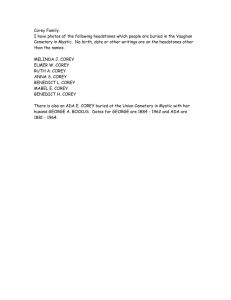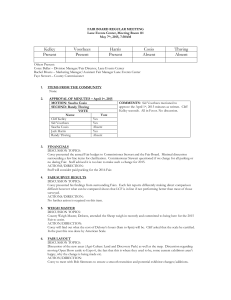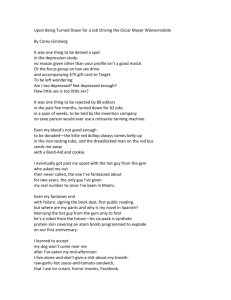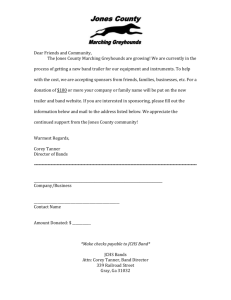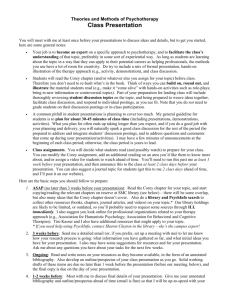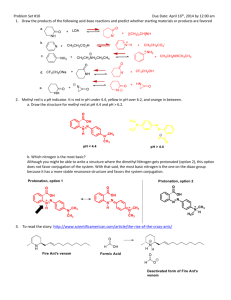cou 820 – group counseling
advertisement
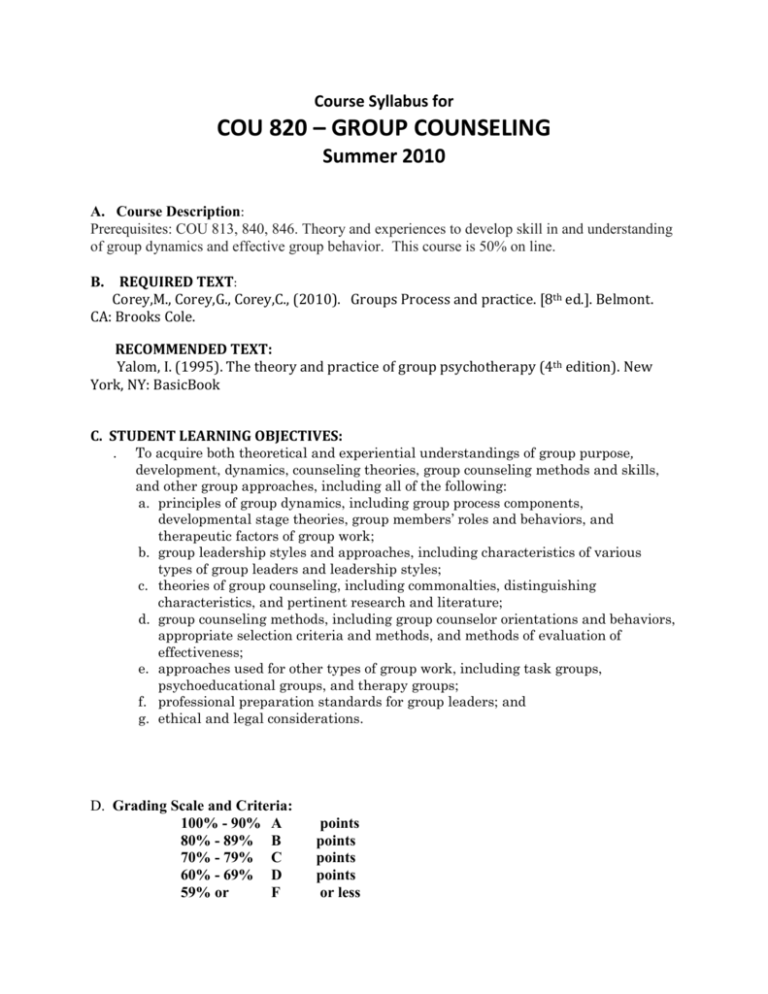
Course Syllabus for COU 820 – GROUP COUNSELING Summer 2010 A. Course Description: Prerequisites: COU 813, 840, 846. Theory and experiences to develop skill in and understanding of group dynamics and effective group behavior. This course is 50% on line. REQUIRED TEXT: Corey,M., Corey,G., Corey,C., (2010). Groups Process and practice. [8th ed.]. Belmont. CA: Brooks Cole. B. RECOMMENDED TEXT: Yalom, I. (1995). The theory and practice of group psychotherapy (4th edition). New York, NY: BasicBook C. STUDENT LEARNING OBJECTIVES: . To acquire both theoretical and experiential understandings of group purpose, development, dynamics, counseling theories, group counseling methods and skills, and other group approaches, including all of the following: a. principles of group dynamics, including group process components, developmental stage theories, group members’ roles and behaviors, and therapeutic factors of group work; b. group leadership styles and approaches, including characteristics of various types of group leaders and leadership styles; c. theories of group counseling, including commonalties, distinguishing characteristics, and pertinent research and literature; d. group counseling methods, including group counselor orientations and behaviors, appropriate selection criteria and methods, and methods of evaluation of effectiveness; e. approaches used for other types of group work, including task groups, psychoeducational groups, and therapy groups; f. professional preparation standards for group leaders; and g. ethical and legal considerations. D. Grading Scale and Criteria: 100% - 90% A 80% - 89% B 70% - 79% C 60% - 69% D 59% or F points points points points or less below A final grade will be determined through the final project, group leadership reflection paper, reaction paper for attending two groups, chapter quizzes and assignments, and class participation. The clinical component of this class will include skill development through participating in a personal growth group, role-plays with classmates, feedback from the professor, group supervisor and peers. This course will be infused with multicultural awareness and sensitivity and by the end of the course you will be expected to know about multicultural competence and display developmentally appropriate multicultural competence. E. STUDENT PROGRESS: You will be provided with written feedback on each assignment. You may at any time during The semester inquire about your current grade by simply going to the online grade book in Blackboard. F. ATTENDANCE POLICY: Attendance in on-campus seminars is essential for effective mastery of the course material. All absences are discouraged. If an absence is unavoidable, it must be discussed with the professor, preferably in advance. Active attendance for any web-based activities is also essential. Students should have a back-up plan in the event that they are unable to access the web from their primary computer. G. LAST DAY TO DROP A CLASS: See EKU academic calendar by clicking calendars on the EKU website at www.eku.edu. H. DISABILITIES STATEMENT: If you are registered with the Office of Services for Individuals with Disabilities, please make an appointment with the course instructor to discuss any accommodations you need. If you need accommodations and are not registered with the Office of Services for Individuals with Disabilities, please contact the office on the third floor of the Student Services Building, by email at disserv@eku.edu or by telephone at (859) 622-2933. Upon individual request, this syllabus can be made available in alternative forms. I. ACADEMIC INTEGRITY Students are expected to be familiar with and to adhere to the university's academic integrity policy. See www.academicaffairs.eku.edu/policy/ J. COURSE REQUIREMENTS: Reading - There is one required and one recommended text for this class; both books integrate research, practice and personal reflection. It is important that you stay current with the reading and come to class ready to discuss the topics outlined in your syllabus. You are required to keep a video reaction journal. This journal is also to be used for detailing your thoughts and reactions to the readings, and personal growth group experiences as well. Video/Course Reflection Journal - (150 points) You are required to watch videos each week. Include one entry in your journal for each of the videos. In addition to other reflections on the videos, you are to include the answers to the following: What issues/questions came up for you as you watched? What reactions did you have to how the group leaders facilitated the group? How would you apply the concepts from the videos to working with groups? What specific skills/interventions did you observe? Were the videos helpful? Why or why not. Chapter quizzes - (120 points) Online multiple choice questions based on the reading. Quizzes l Completion of Weekly Assignments (100 points) Essay questions based on the reading. Group Participation and Leadership Skills – (80 points) As a part of this course you are required to participate in a personal growth group. The focus of this group is on your personal growth and development as a counseling professional. The group will meet for 3-4 sessions, which will occur during class time. You will take on the roles of group leader, group observer and group participant. Group leadership will rotate every group and will meet with the instructor before the group you lead and will meet with the group supervisor and process observers after your group. To prevent introduction of personal issues (introduced or discussed during the group sessions) into the grading of this course, the instructor of this course will only receive process evaluations of class members from the group supervisor. A reflection paper on your experiences of being a group participant in the personal growth group that includes how this course impacted the way you view and understand groups. Group Leader Reflection Report – (100 points) The group leader refection report is due. the class after you co-lead the group. Length: 2 pages – Group leaders will integrate their academic and personal experience with group dynamics in a written paper. Apply your readings in group process to an analysis of your own experience as a group leader. Students should focus on their group leadership skills and style of leadership, what they feel they did well, where they would like to improve, how you develop trust within a group, resistances you are aware of, etc. What would you plan for the next group if you were to continue to lead that group? Reaction Paper of Attending two Groups: (135 points) Attend one Self Help Group (example would be any 12 step program) and a Support Group with a leader (examples are; those who have loved ones who are dying, stepparents, caregivers of those with cancer or some other disease). In selecting a meeting, students should be aware of the difference between “open” and “closed” meetings. Open meetings are, as the name implies, open to the public and designed to provide information to the public regarding the problem being addressed. Closed meetings are limited to those who identify as seeking help with the problem being addressed. So, while anyone is welcome to attend an open meeting, only those who identify as having a problem should attend a closed meeting. In either case, students should realize that for the purposes of this assignment, they are guests at the meeting. It would be inappropriate to do anything that would negatively impact the meeting such as taking notes or giving advice to the group members. In your reaction paper, clearly identify the type of group you attended, date and location of the group, and what occurred in the group. Integrate terms from your reading of the text to describe your observations regarding group dynamics, group leadership, and the stage at which the group appears to be functioning. Discuss any dynamics you observe that may have been due to cultural influences from various members of the group. Compare and contrast your attendance at the Self Help group with your experience of the Support group. Class Participation – (60 points) You are expected to be an active participant in this class and your personal growth group, engaging in lectures, asking questions and providing feedback to your class mates. You will be actively involved in soliciting and providing feedback to other members of the class in a professional manner and participating in class exercises. The focus will be on providing developmentally appropriate, specific and clinically relevant feedback to class members to facilitate their growth as a group leader. Final Project – (270 points) Your group will identify a need for a psychotherapy or psychoeducational group in a community or school that you are interested in working with. Once the group identifies the need and population, you will engage in reviewing the literature for information to support the need for a group, as well as best practices and group interventions. Requirements for this project and a grading rubric are located on blackboard. Confidentiality -It is expected that all classroom discussions and group interactions remain confidential to facilitate honest communication. COURSE OUTLINE: Introductions Review Syllabus History of Group Counseling Introduction to Group Leadership Initial Stages of a Group Overview of Yalom's Therapeutic Factors View Video: Evolution of a group Personal Growth Group – Session 1 Developmental Aspects of Group Counseling Week 2 NO ON CAMPUS MEETING Review: PowerPoints Corey,Corey, Corey chapters 1-5 (on Blackboard) Read: Corey, Corey, Corey, Chapters 1- 5 Yalom, Chapter 1, The Therapeutic Factors, Chapter 2, Interpersonal Learning, Chapter3, Group Cohesiveness, Chapter 4 The therapeutic factors: An integration, Chapter 5, the Therapist: Basic Tasks, Chapter 16 Group Therapy and the Encounter Quizzes: Complete Chapter 1-5 Quiz, Corey, Corey, Corey View Videos: (1) Getting Started In Group Psychotherapy http://ctiv.alexanderstreet.com/View/530254 (2) Leading In The Here And Now: The Initial Stage http://ctiv.alexanderstreet.com/View/53493 (3) Leading In The Here And Now: Transition and Flight http://ctiv.alexanderstreet.com/View/534931 Information for accessing videos on BlackBoard under ‘COURSE INFORMATION’ REMINDER: Reaction Paper of Attending two Groups Due Week 3 NO ON CAMPUS MEETING Review: PowerPoints: Corey, Corey, Corey Chapter 6-8 Read: Corey, Corey, Corey Chapte65-8 Yalom, Chapter 6 The Therapist Working in the here and now Chapter 7 The Therapist: Transference and Transparency, Chapter 8, The Selection of Patients, Chapter 11, In the Beginning. Quizzes: Complete Chapter 5-8 Quizzes, Corey, Corey, Corey Homework Assignment: Respond to questions in Corey, Corey, Corey pages 28 #6, page 70#5 &10, page 132 #1 & 10, page 228 #8 & 10. View Videos: (1) Afrocentrics Approaches to Group Work: I Am Because We Are http://ctiv.alexanderstreet.com/View/526247 (2) Leading In The Here And Now: Group Conflict and Summation http://ctiv.alexanderstreet.com/View/526587 Information for accessing videos on BlackBoard under ‘COURSE INFORMATION’ Personal Growth Group Session 2 Group (May meet off Campus) Week 4 Review ( before class) PowerPoints- Corey, Corey, Corey Chapters 9-10 Read: (Before class) Corey, corey, Corey Chapters 9-10 Yalom; Chapter 9, Composition of therapy groups, Chapter 10 Creation of the group: Place, Time, Size Preparation, Chapter 12 The advanced group. Quizzes: Complete Chapter 9-10 Quiz, Corey, Corey, Corey Homework Assignment: Respond to question in Corey, Corey, Corey, page 288,#2,7,& 10, page 322, #2& 4 View Video: (before class) (1) Encouraging Risk-Taking In Group : http://ctiv.alexanderstreet.com.libproxy.eku.edu/View/534730 (2) Developmental Aspects of Group Counseling; Working Stage http://ctiv.alexanderstreet.com.libproxy.eku.edu/View/536286 Personal Growth Group: Session 3 Week 5 Review: ( before class)Powerpoints: Corey, Corey, Corey Chapter 11-12 (on Blackboard) Read: (before this class) Corey Chapter 11-12 Yalom; Chapter 13, Problem Patients, Chapter 14, Specialized formats and procedural aids, Chapter 15 The specialized Therapy group Quizzes: Complete Chapter 11-12 Quizzes, Corey, Corey, Corey Homework Assignment: Respond to questions in Corey, Corey, Corey page 356#1, 2, & 5. View Video (before class): (1) Developmental Aspects of Group Counseling, Part 3: Working Stage/Termination (2)Facing Our Future: Group Procedures With Older People (3) Group Microskills: Encountering Diversity All three videos are on alexanderstreet.com. Don't forget you must go through EKU library to gain access to videos. Personal Growth Group Session 4 Reaction Paper of Attending two Groups Due Week 6 NO ON CAMPUS MEETING Group Project Due Final Reflection Paper Due
